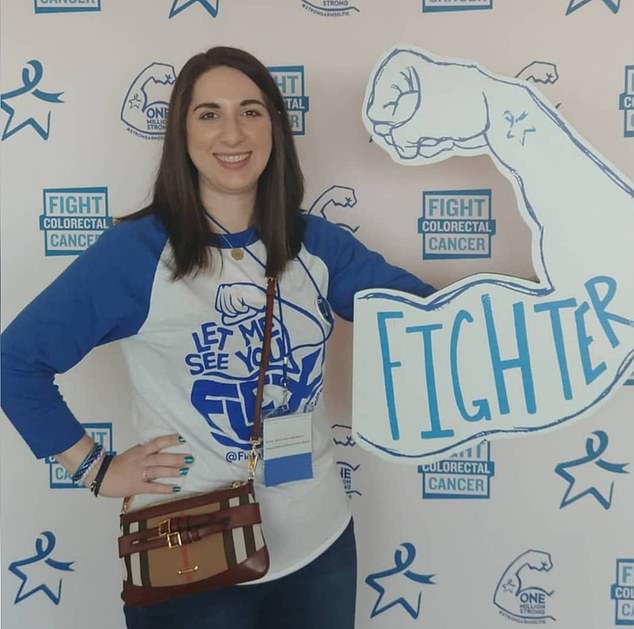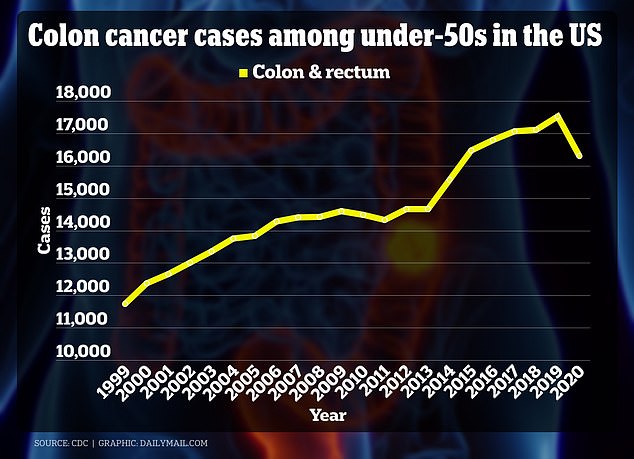Researchers may be one step closer to unraveling the cause of a colon cancer crisis in relatively young people.
They have discovered that a combination of eating too much sugar and not enough fiber causes the intestine to produce bacteria that accelerate the aging of people’s cells.
This makes them more susceptible to mutations and damage that lead to cancer and less likely to be able to combat the growth of tumor cells. according to new research presented at the world’s largest cancer conference this weekend.
Meanwhile, an independent study revealed at the conference theorizes that energy drinks could be partly fueling the colorectal cancer epidemic among those under 50.
The researchers behind that trial believe that an ingredient called taurine feeds and promotes the growth of harmful intestinal bacteria linked to the disease.
The graph above shows the increase in colorectal cancer in young Americans from 1999 to 2020.

Evan White is pictured above with his fiancée Katie Briggs and their dog Lola. The couple began dating when Evan had cancer and became engaged when his condition stabilized. However, he died after four years fighting the disease.

Marisa Maddox (pictured) was diagnosed with colon cancer at age 29. This has left her infertile, depriving her of the opportunity to have the large family she always wanted.
The new findings come as colorectal cancer rates among Americans under age 50 are expected to double from 2010 to the end of the decade.
Doctors trying to figure out what’s behind the rapid rise have suspected for some time that modern diets are somehow to blame.
Researchers presenting at the American Society of Clinical Oncology (ASCO) annual meeting in Chicago this week believe they have taken another step toward understanding the role played by the foods we eat.
In an abstract of the new paper, which has not yet been published, the Ohio State University team examined genetic samples from young (under 50) and older people with colon cancer.


Joe Faratzis, 34, of Los Angeles, is pictured above in his mid-twenties before his stage four colon cancer was detected (left) and during treatment he began in 2020 (right).
They found that younger patients who ate low-fiber, high-sugar diets produce a bacteria called Fusobacterium, which increases inflammation throughout the intestine by binding to pro-inflammatory proteins.
Fiber, on the other hand, slows the release of blood glucose (blood sugar) and feeds healthy gut bacteria that reduce inflammation.
Sustained inflammation has been shown to age cells, and researchers estimated that regular poor diets in young colorectal cancer patients aged their cells up to 15 years longer than a person’s biological age.
This is a phenomenon called “inflammation.”
Older cells are more vulnerable to cancer because they are more damaged and more likely to suffer mutations that make them susceptible to disease.
Meanwhile, older colon cancer patients had cells on par with their actual ages.
The researchers estimated that while 20 percent of early-onset colorectal cancers are inherited from parents, the remaining cases “remain poorly understood.”
“These data suggest that pathogenic microbes can induce inflammation, leading to accelerated aging (in early-onset colorectal cancer),” the researchers wrote.
The team noted that the findings align with other recent data, suggesting that processed, low-fiber diets alter the balance of the gut microbiome in a process called gut dysbiosis.
The findings come as 95 percent of Americans do not consume enough fiber, according to the USDA.
The agency recommends that adults consume 25 to 30 grams of fiber every day, which is roughly equivalent to two to three bowls of oatmeal or one cup of chickpeas.
However, most Americans consume only 10 to 15 grams of fiber per day.
In addition, researchers from the University of Florida presented this weekend a trial that will aim to evaluate the effect of energy drinks on young patients with colorectal cancer.
The team is recruiting 60 colorectal cancer patients ages 18 to 40 with no family history of the disease to see if taurine, an ingredient in energy drinks like Red Bull, feeds bacteria that metabolize H2S, which has been linked with a higher incidence of colorectal cancer.
«These bacteria preferentially use taurine, an essential amino acid, as a primary energy source. “Energy drinks represent one of the largest dietary sources (between 6 and 16 times normal daily intake) of taurine in the contemporary diet,” the team wrote.
“We hypothesize that elevated levels of taurine in energy drinks could exacerbate CRC risk by promoting the preferential growth and metabolic activities of H2S-producing bacteria already present, contributing to increased (early-onset) CRC. “
As of March 2024, 32 percent of adults ages 18 to 29 regularly consume energy drinks, and energy drinks are the second most popular “dietary supplement” among adults in that age group, behind multivitamins.


